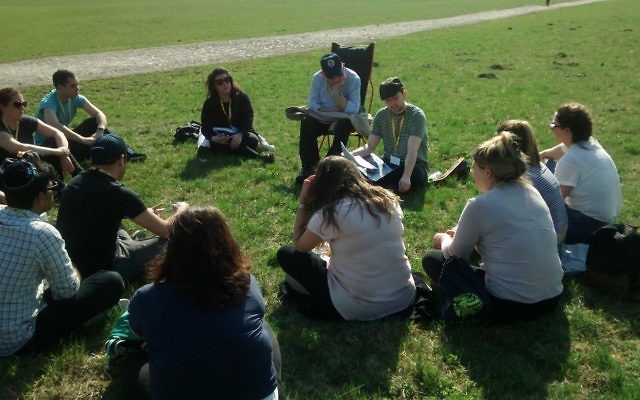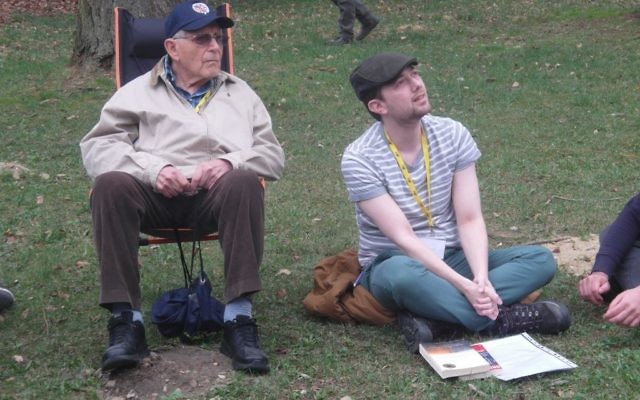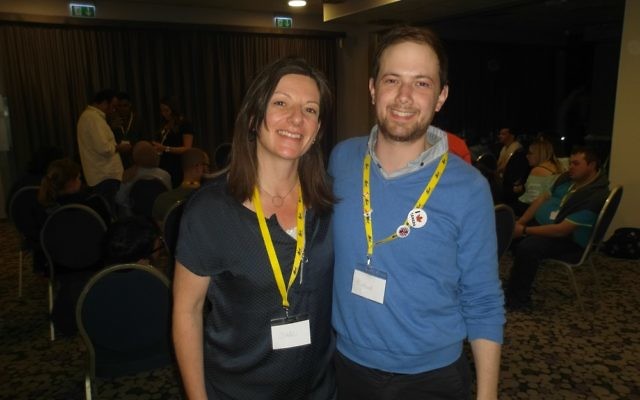March of the Living – The educators
Jewish News’ Andrew Sherwood speaks to those who act as guides on the trip, who’s extensive knowledge in Poland’s history and the Holocaust provide participants with everything they could possibly need to know
Andrew Sherwood is the Jewish News Sport and Community Editor

An exhaustive and intense five-day trip, a programme covering hundreds of miles, three-hour walks, emotionally-draining visits to Death Camps and Concentration Camps, visiting mass graves in desolate forests and still being there to answer questions and provide thought-provoking conversation and discussion, the role of the educator is arguably one of the most important on March of the Living.
With this year’s UK Delegation being the biggest ever, participants were split into seven groups, each of which was then split into a further two. Meaning there were 14 educators on this trip, I spoke to those who were in charge of Group F, a Young Professionals group, Richard Verber and Jude Williams.
The second time they’ve worked together, Richard, who is also the senior vice-president of The Board of Deputies, was working for the UJS in 2010 when he got the call from MOTL UK founder Scott Saunders.
“Scott said he had an idea of doing a British Delegation for MOTL International. For whatever reason there hadn’t been a UK Delegation, in fact one Manchester Jewish high school flew children out to Poland for the day – which I guess is a way of doing Holocaust Education – but that was it. He felt in order to add value to the Holocaust Education offerings in the UK, MOTL UK could potentially become an incredibly important thing. I said ‘great, let’s try it’”.
Citing two important things that need to be – and always have been – in place for it to work, he said: “Firstly, it needs to be a cross-communal thing – for every one of every background – just somewhere where everybody could be comfortable, whether you were incredibly involved in the Jewish community or were Jewish, but had no connections with the Jewish community.

“Secondly, we wanted to set this up to be the pinnacle of Holocaust Education. We’re not interested in making people feel in a special way religiously, or politically, we’re not interested in making people feel a special way about Israel. All those things are really important, and we talk about all those things in our various discussion groups, but we don’t come in with an agenda and that’s what I think makes us so unique and so special. Coupled with the fact that thank G-d we’re still able to put a Holocaust Survivor on each of our buses, that’s why this is a trip like no other, one that culminates in a unique experience that is the march itself.”
Explaining why he enjoys the role, he says: “It’s just a unique experience. I was a participant for a few years, then a bus leader, then a leader of the bus leaders, and now educator. I didn’t come with any background into this – I don’t even have a history GCSE! I’m unqualified in that sense, but having been here so many times and the passion I have for it, it I love it!”
Covering hundreds of years of history, possessing a seemingly encyclopedic knowledge of dates, figures, places and people, learning all the information was obviously no mean feat. “I spent an entire month last year just immersing myself into the knowledge – and it was one of the hardest things I’d ever done in my entire life. I really feel the burden on my shoulders that we’re taking a group of people – some of whom for the first time in their life – to Poland and that we have to guide them through the sites, help them have an experience and it really works. This year being my second year [as an educator] I’ve been able to put even more in and it’s so rewarding, what people say to you. We don’t do it for the compliments but can really see that people are enjoying it and engaging with us.”
Jude says she finds the role “incredibly satisfying” and has a deeply personal reason for being one of the educators. “I do it because my father was a Holocaust Survivor [who passed away 11 years ago]”, she says. “In his retirement, he spoke to groups three or four times a week. He spoke to about 40,000 kids and when he passed away, it felt like the baton had been passed to me. Having worked as an educator, I felt I had the knowledge and skills, but more importantly felt like I needed to do something. MOTL came around not just as something nice to volunteer to do, but as a really important legacy that is my own family’s history.”

Happy with how this year’s trip went, she said: “I think it was a great week and went really well. There are a few different ingredients [which make it great]. The group coming together, sharing and thinking together, engaging in conversation is a really important part to it. In our groups, we can question, engage and support each other.
“I think we had great weather which had some influence, the logistics all went together which meant we just had to use the sites and create this platform for everybody. It all went very smoothly and I have to say, this was a brilliant group.
“We received a lot of positive feedback, it’s not necessarily about filling everyone up with loads of knowledge, but opening up the questions and giving people an experience about thinking of those questions and they’re really deep questions.”
The pinnacle of the event is the march itself, something Richard describes as ‘unique’. He says: “We, the UK’s biggest ever delegation, are standing here in Auschwitz with nearly 12,000 people – it’s just a unique experience. You have flags, badges, people taking pictures – it’s just a very special experience.
“Back in 2010, there were eight participants, but even back then, we knew it could be something special, the following year we took an entire UJS bus and it’s gone on from there. All the youth movements are involved, we have a young adults bus and for me, I want this to become a rite of passage for the British Jewish community.
“I think it’s absolutely vital that the British Jewish Community broadens its horizon of Holocaust Education and that it’s done without agenda. There are many other such trips that the Jewish community offer, but this is one I think everyone should go on.”

Thank you for helping to make Jewish News the leading source of news and opinion for the UK Jewish community. Today we're asking for your invaluable help to continue putting our community first in everything we do.
For as little as £5 a month you can help sustain the vital work we do in celebrating and standing up for Jewish life in Britain.
Jewish News holds our community together and keeps us connected. Like a synagogue, it’s where people turn to feel part of something bigger. It also proudly shows the rest of Britain the vibrancy and rich culture of modern Jewish life.
You can make a quick and easy one-off or monthly contribution of £5, £10, £20 or any other sum you’re comfortable with.
100% of your donation will help us continue celebrating our community, in all its dynamic diversity...
Engaging
Being a community platform means so much more than producing a newspaper and website. One of our proudest roles is media partnering with our invaluable charities to amplify the outstanding work they do to help us all.
Celebrating
There’s no shortage of oys in the world but Jewish News takes every opportunity to celebrate the joys too, through projects like Night of Heroes, 40 Under 40 and other compelling countdowns that make the community kvell with pride.
Pioneering
In the first collaboration between media outlets from different faiths, Jewish News worked with British Muslim TV and Church Times to produce a list of young activists leading the way on interfaith understanding.
Campaigning
Royal Mail issued a stamp honouring Holocaust hero Sir Nicholas Winton after a Jewish News campaign attracted more than 100,000 backers. Jewish Newsalso produces special editions of the paper highlighting pressing issues including mental health and Holocaust remembrance.
Easy access
In an age when news is readily accessible, Jewish News provides high-quality content free online and offline, removing any financial barriers to connecting people.
Voice of our community to wider society
The Jewish News team regularly appears on TV, radio and on the pages of the national press to comment on stories about the Jewish community. Easy access to the paper on the streets of London also means Jewish News provides an invaluable window into the community for the country at large.
We hope you agree all this is worth preserving.





















